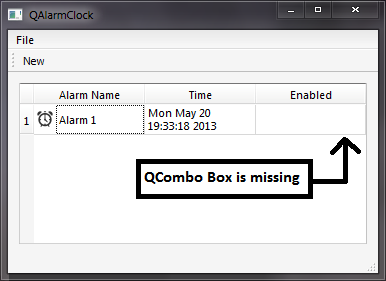I followed the Spin Box Delegate tutorial, which Qt provides, to try to implement my own QItemDelegate. It would be used to specify a QComboBox to represent data in a QTableView cell but it is not working.
My biggest problem is that I don't know when my QItemDelegate is going to be utilized.
when
itemModel->setData()is used or whenitemModel->setItem(). I would suspectsetItem()because I reimplemented aQItemDelegate(emphasis on the "Item") but the tutorial usessetData()and it works fine.I know that if the specified
QItemDelegatedoes not work it uses the default one but how do I now that the one I specified did not work?when should I suspect for
QTableViewto use my delegate. I would like to specify which delegates to use for each cell. Is this possible or does theQTableViewonly use one delegate throughout?How would I specify the items to populate the
QComboBoxonce it gets displayed by theQTableView?
I implemented QItemDelegate here:
- the part where I try to add the cell which is suppose to use the
QComboBoxis under the comment "Enabled" in mainwindow.cpp further down this post.
qcomboboxitemdelegate.h
#ifndef QCOMBOBOXITEMDELEGATE_H
#define QCOMBOBOXITEMDELEGATE_H
#include <QItemDelegate>
#include <QComboBox>
class QComboBoxItemDelegate : public QItemDelegate
{
Q_OBJECT
public:
explicit QComboBoxItemDelegate(QObject *parent = 0);
QWidget* createEditor(QWidget *parent, const QStyleOptionViewItem &option, const QModelIndex &index);
void setEditorData(QWidget *editor, const QModelIndex &index);
void setModelData(QWidget *editor, QAbstractItemModel *model, const QModelIndex &index);
void updateEditorGeometry(QWidget *editor, const QStyleOptionViewItem &option, const QModelIndex &index);
signals:
private:
};
#endif // QCOMBOBOXITEMDELEGATE_H
qcomboboxitemdelegate.cpp
#include "qcomboboxitemdelegate.h"
#include <QDebug>
QComboBoxItemDelegate::QComboBoxItemDelegate(QObject *parent)
: QItemDelegate(parent)
{
}
QWidget* QComboBoxItemDelegate::createEditor(QWidget *parent, const QStyleOptionViewItem &option, const QModelIndex &index) {
// create widget for use
QComboBox* comboBox = new QComboBox(parent);
return comboBox;
}
void QComboBoxItemDelegate::setEditorData(QWidget *editor, const QModelIndex &index) {
// update model widget
QString value = index.model()->data(index, Qt::EditRole).toString();
qDebug() << "Value:" << value;
QComboBox* comboBox = static_cast<QComboBox*>(editor);
comboBox->setCurrentIndex(comboBox->findText(value));
}
void QComboBoxItemDelegate::setModelData(QWidget *editor, QAbstractItemModel *model, const QModelIndex &index) {
// store edited model data to model
QComboBox* comboBox = static_cast<QComboBox*>(editor);
QString value = comboBox->currentText();
model->setData(index, value, Qt::EditRole);
}
void QComboBoxItemDelegate::updateEditorGeometry(QWidget *editor, const QStyleOptionViewItem &option, const QModelIndex &index) {
editor->setGeometry(option.rect);
}
mainwindow.cpp : this is where I initialize the QStandardItemModel
void MainWindow::init() {
itemModel = new QStandardItemModel(this);
}
void MainWindow::setupUi() {
this->setWindowTitle("QAlarmClock");
QStringList labelList;
labelList << "Alarm Name" << "Time" << "Enabled";
itemModel->setHorizontalHeaderLabels(labelList);
ui->tableView->setModel(itemModel);
ui->tableView->horizontalHeader()->setSectionResizeMode(QHeaderView::Stretch);
ui->tableView->setItemDelegate(comboBoxItemDelegate);
}
void MainWindow::on_actionNew_triggered() {
alarmDialog = new AlarmDialog(this);
connect(alarmDialog, SIGNAL(on_close()), this, SLOT(on_alarmDialog_close()));
alarmDialog->exec();
}
mainwindow.cpp : this is where I update QStandardItemModel
void MainWindow::on_alarmDialog_close() {
QString alarmName = alarmDialog->getAlarmName();
QDateTime alarmDateTime = alarmDialog->getDateTime();
itemModel->insertRow(itemModel->rowCount());
int rowCount = itemModel->rowCount();
// Alarm Name
QStandardItem* alarmItem = new QStandardItem(QIcon("res/alarmclock.ico"), alarmName);
itemModel->setItem(rowCount - 1 , 0, alarmItem);
// Date Time
QStandardItem* dateTimeItem = new QStandardItem();
dateTimeItem->setText(alarmDateTime.toString());
dateTimeItem->setEditable(false);
itemModel->setItem(rowCount - 1, 1, dateTimeItem);
// Enabled
QStandardItem* enabledItem = new QStandardItem();
QList<QStandardItem*> optionList;
optionList << new QStandardItem("Enabled") << new QStandardItem("Disabled");
enabledItem->appendRows(optionList);
itemModel->setItem(rowCount - 1, 2, enabledItem);
}
Edit 1
qcomboboxdelegate.cpp
QWidget* QComboBoxItemDelegate::createEditor(QWidget *parent, const QStyleOptionViewItem &option, const QModelIndex &index) {
// create widget for use
qDebug() << "Column: " << index.column();
if (index.column() == 2) {
QComboBox* comboBox = new QComboBox(parent);
QStringList values;
values << "Enabled" << "Disabled";
comboBox->addItems(values);
return comboBox;
} else {
return QItemDelegate::createEditor(parent, option, index);
}
}
mainwindow.cpp
void MainWindow::on_alarmDialog_close() {
QList<QStandardItem*> row;
QString alarmName = alarmDialog->getAlarmName();
QDateTime alarmDateTime = alarmDialog->getDateTime();
QString status = "Enabled";
// Alarm Name
QStandardItem* alarmItem = new QStandardItem(QIcon("res/alarmclock.ico"), alarmName);
row << alarmItem;
// Date Time
QStandardItem* dateTimeItem = new QStandardItem();
dateTimeItem->setText(alarmDateTime.toString());
dateTimeItem->setEditable(false);
row << dateTimeItem;
// Enabled
QStandardItem* statusItem = new QStandardItem(status);
row << statusItem;
itemModel->appendRow(row);
}

